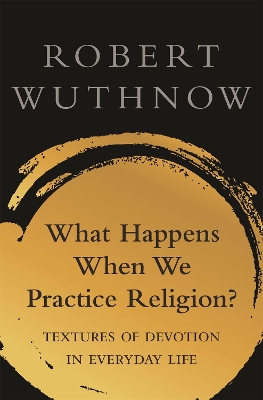An exploration of the interdisciplinary methods used to understand religious practice
Religion is commonly viewed as something that people practice, whether in the presence of others or alone. But what do we mean exactly by "practice"? What approaches help to answer this question? What Happens When We Practice Religion? delves into the central concepts, arguments, and tools used to understand religion today.
Throughout the past few decades, the study of religion has shifted away from essentialist arguments that grandly purport to explain what religion is and why it exists. Instead, using methods from anthropology, psychology, religious studies, and sociology, scholars now focus on what people do and say: their daily religious habits, routines, improvisations, and adaptations. Robert Wuthnow shows how four intersecting areas of inquiry-situations, intentions, feelings, and bodies-shed important light on religious practice, and he explores such topics as the role of religious experiences in sacred spaces, gendered social relationships, educational settings, the arts, meditation, and ritual.
Suitable for undergraduate and graduate courses, What Happens When We Practice Religion? provides insights into the diverse ways that religion manifests in ordinary life.
- Summarizes the latest theories and empirical methods of religious practice
- Shows how the study of religion has changed
- Includes chapters on theory, situations, intentions, feelings, and bodies
- Draws from anthropology, psychology, religious studies, and sociology
- Accessible for undergraduate and graduate courses
- ISBN10 0691198594
- ISBN13 9780691198590
- Publish Date 19 May 2020
- Publish Status Active
- Publish Country US
- Imprint Princeton University Press
- Format Paperback (US Trade)
- Pages 256
- Language English
